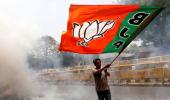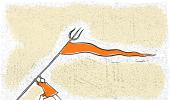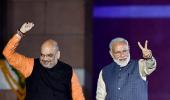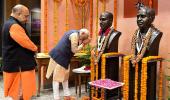Over two dozen Muslims have been elected to the Lok Sabha. This shows that all is not lost for India's Muslims, suggests Mohammad Sajjad.
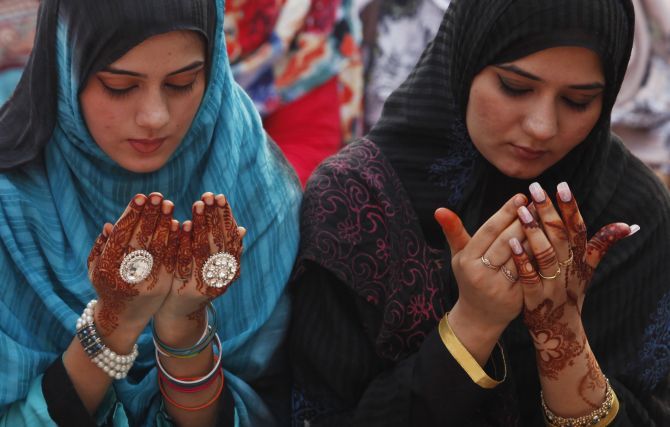
Many are surprised that such a massive support for Modi was not visible during the campaign.
In my understanding, the simple reason for this is: BJP supporters, otherwise quite vocal, did not have the moral courage to show up this support because they had nothing to show as accomplishments on the fronts of the economy, employment and farm sector.
Be that as it may, for me, this huge verdict for the BJP was quite foreseeable.
Talking to cross-sections of people and monitoring social media, more particularly, village-based WhatsApp groups, there were unambiguous indications that increasingly larger numbers of Hindus, cutting across caste lines, were inclined to give Modi a second term.
On these platforms of social media, even some well-meaning Hindus did not show their disapproval -- what to say of outrage -- of lynchings and other such outrageous issues.
Rather, many of them were gaga over 'muscular nationalism'.
It not only admires the powerful individual hero who would take care of the enemy neighbour, but will also fix all stumbling blocks in the path of economic development.
Many stereotypes against India's Muslims -- the so-called high-breeding community -- are seen as such stumbling blocks.
Even during the election campaign, the BJP did not speak about its 'achievements' on the economy, employment, etc.
Its overwhelming supporters were also not concerned about such issues.
Quite a lot of them were dismissive about the hazards of demonetisation and GST, about the Rafale deal, fleeing businessmen wreaking havoc on public sector financial institutions and banks.
They ignored why the BJP dismantled rural employment programmes.
True, the Ujjawala scheme and Swachhta Abhiyan are indeed very good pro-poor social welfare schemes of the Modi government.
But did it really work on the ground? Could the poor afford to get another cylinder of cooking gas? All these were of no concern.
On social media those who raised such issues were declared to be working against Modi who personifies the collectivity of not only the desh (territory) but also the rashtra (people).
Jingoism had helped Indira Gandhi as well.
On village-based WhatsApp groups, raising any such issue of citizens's concerns encountered disdain.
If the critic happened to be a Muslim, then it was even quicker and easier to declare such valid criticism to be unpatriotic, and at times, even a treasonable offence.
Mere social media may not have succeeded in misguiding and polluting Indian common sense.
The television news channels, most of these are now owned by big corporate houses, have contributed much towards creating such a 'Hindu common sense' and anti-Muslim hatred.
They would rather argue that the Modi regime contributed towards enhancing India's stature in the eyes of the world.
Little do they realise that the rise of un-reason and anti-Muslim persecution have earned criticism in the international media -- newspapers like The Guardian, The New York Times, Washington Post, and magazines like Time and the New Yorker, etc.
All these are attributed to anti-Hindu conspiracy theories.
Even a cloud-radar theory of stupidity failed to make the people realise this.
A segment of quite well-meaning Hindus, saffonised only recently, try to argue on social media, that the cases of lynchings should be ignored.
They don't accept how the spectacularly videographed lynchings are actually backed by the State whereby even ministers go on to garland the accused freed on bail.
There are some plausible reasons for such a state of affairs having arrived in India.
In the early decades of Independence, the upper castes enjoyed power and privilege through the ruling Congress, with passive, un-demanding voters from the Dalits, minorities and tribes.
The Socialists and Communists performed the role of the Opposition.
The weak and vague idea of 'Indian Secularism', and rhetoric against anti-Muslim communalism helped the ruling elite provide the minorities with some assurance through such lip-service.
Intra-upper caste factionalism within the ruling Congress also, to some extent, was helpful for the elite of the weaker sections including minorities.
All these helped checkmae and restrain Hindutva.
During this era too, the perpetrators of communal violence and politicians conspiring to engineer such riots remained unpunished.
Subsequently, the OBCs rose and they came into their own in the post-Mandal era.
These erstwhile Socialists (and Communists) remained regional powers.
Barring the Communists, most of these regional forces challenged the upper caste hegemony in the structures and processes of power.
In southern India, these regional powers performed on governance and development.
In parts of northern India, such forces were reduced to a single dominant OBC caste, and more recently into a particular dynasty of the said caste.
They remained under-achievers in terms of governance and development, in education and health, in infrastructure, roads, electricity, and other middle class concerns.
Because of which the dislocation of the upper caste elites received a harsher blow.
Rather than handle these issues with tact, such newly empowered OBC rulers resorted to anti-upper caste rhetoric and slogans, thereby consolidating the OBCs and Dalits.
Since they handled communal violence, the minorities remained their support base.
Moreover, the Mandal Commission benefitted large segment of the Muslim communities in education and employment.
In this story of the rise of the OBCs and Dalit rulers, in course of time, even the lower OBCs and lower Dalits felt left out of political power.
Assured with the Muslim votes, such forces/dynasts (like the SP, BSP, RJD, and now the TMC may also be added) kept ignoring these left out groups, yet retaining power.
These left out groups also, in addition to the upper castes, therefore, came to harbour disdain/hatred against the Muslims whose votes kept those (non-performing) forces in power.
Moreover, the rising affluence of Muslims (also through Gulf remittances), their rise in education, and their rising representation in rural and urban local bodies, (which makes their political and economic rise much more visible to their Hindu neighbourhood) have added to anti-Muslim hatred and Hindu consolidation.
The BJP came to address these neglected social groups.
Besides, the BJP regimes in provinces like Madhya Pradesh, Chhattisgarh and Rajasthan were better performers than the RJD, SP, BSP kind of regimes.
Now, the upper castes, in alignment with these social forces (like non-Yadav OBCs and non-Jatav Dalits), constitute the core support of the BJP.
In West Bengal, the Bhadralok who seem threatened about their pre-eminence with the rise of Muslims and Namashudras -- something many of them had felt during 1937 and 1947, and had then moved over to the Hindu Mahasabha kind of forces -- constitute the BJP's core support-base.
This social engineering of the BJP outnumbers other groups.
This partly explains: a. The BJP's electoral success; b. The rise in anti-Muslim hatred; and c. The rage with which the RJD has been defeated with huge margins in Bihar.
These phenomena help the BJP consolidate and strengthen itself.
It may be relevant to note that this kind of social engineering to widen the social base of saffron politics was envisaged more by then then RSS chief Madhukar Dattatreya ' Balasahab' Deoras.
His roles and vision in this regard, at the level of both theory and practice, remain a lesser known fact for many of us.
In short, while in the early decades of Independence, the rhetoric of 'Indian secularism' helped Hindu elites to retain power through the Congress, now it is Hindutva, anti-Muslim rhetoric and actions, jingoism, and muscular nationalism which helps these elites get and retain power, through the BJP.
What lies ahead for the Muslims?
So long as the largely hollow rhetoric of secularism existed, the tiny Muslim elites, religious conservatives and misogynists remained happy and smugly content with the little patronage they secured from the Congress and the erstwhile Socialist groups such as the SP, BSP, RJD, etc.
In south India, the scenario was/is little different, hence, in those parts, the Muslims did make some efforts towards capacity-building in education, skill-development and trade.
In northern and eastern India, Muslims need to learn this.
India's Muslims in general, as a whole, ignored the issues of certain kinds of theological-social reforms, more particularly on gender justice.
This was one of the many factors behind the rise of majoritarianism in the 1980s.
In the 2019 election, over two dozen Muslims have been elected to the Lok Sabha.
This shows that all is not lost for India's Muslims.
Some Hindus are still willing to vote for Muslim candidates in certain pockets.
But mere quantitative representation will not do.
Muslims, as citizens, need to become much more vigilant about the legislative and political roles played by their incumbent and aspiring legislators.
Their roles in the legislative arena need to be audited much more meticulously.
They must be made much more accountable.
They should owe their leadership more to their substantial and meaningful activism on the ground and inside the legislature, rather than to their loyalties to certain party chiefs, who impose any unworthy candidate, bearing a Muslim name, upon the Muslims.
Moreover, the Muslim legislators must also reflect the intra-Muslim social heterogeneities in its composition.
More and more Muslims, as citizens, rather than as religious groups, need to join the various non-identitarian civil society groups agitating for civic rights, amenities and criminal justice.
Taking up this challenge is now a greater necessity of India's Muslim than it has been ever before.
Mere breast-beating on the rise to power of a majoritarian force, and sitting idle, waiting for a miraculous messiah, will not do.
Let this crisis of increased marginalisation be turned into an opportunity of redefining political priorities and participation of Muslim communities in various struggles to save and strengthen Indian democracy.
Well, there are apprehensions that many Indian cities may be turned into Ahmedabad which has been segregated into two parts: State-sponsored ghettoisation of Muslims in Juhapaura within the city and the rest developed as a shining, modern city.
Nonetheless, rather than lose hope, moving ahead to find a way out has to be preferred.
Many more Hindus are lending their arms asking Muslim communities to join the struggles for citizenship rights and to move towards strengthening progressivism and plurality in India.
Professor Mohammad Sajjad teaches history at the Centre of Advanced Study in History, Aligarh Muslim University.

